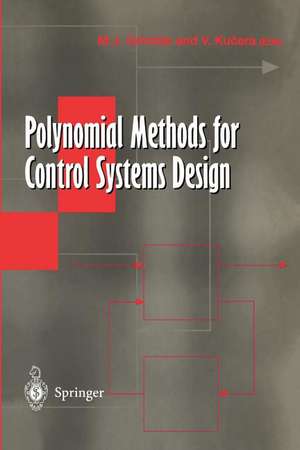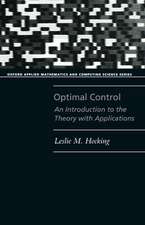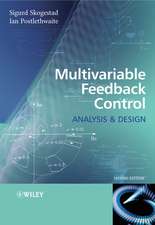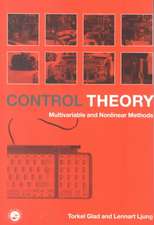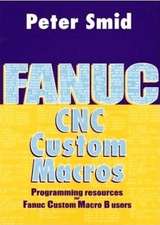Polynomial Methods for Control Systems Design
Editat de Michael J. Grimble, Vladimir Kuceraen Limba Engleză Paperback – 27 sep 1996
Preț: 639.08 lei
Preț vechi: 751.86 lei
-15% Nou
Puncte Express: 959
Preț estimativ în valută:
122.28€ • 128.02$ • 101.18£
122.28€ • 128.02$ • 101.18£
Carte tipărită la comandă
Livrare economică 07-21 aprilie
Preluare comenzi: 021 569.72.76
Specificații
ISBN-13: 9783540760771
ISBN-10: 3540760776
Pagini: 268
Ilustrații: X, 255 p.
Dimensiuni: 155 x 235 x 14 mm
Greutate: 0.38 kg
Ediția:Softcover reprint of the original 1st ed. 1996
Editura: SPRINGER LONDON
Colecția Springer
Locul publicării:London, United Kingdom
ISBN-10: 3540760776
Pagini: 268
Ilustrații: X, 255 p.
Dimensiuni: 155 x 235 x 14 mm
Greutate: 0.38 kg
Ediția:Softcover reprint of the original 1st ed. 1996
Editura: SPRINGER LONDON
Colecția Springer
Locul publicării:London, United Kingdom
Public țintă
ResearchCuprins
Preface ix.- 1 A Tutorial on H2 Control Theory: The Continuous Time Case.- 1.1 Introduction.- 1.2 LQG control theory.- 1.3 H2 control theory.- 1.4 Comparison and examples.- 1.5 References.- 2 Frequency Domain Solution of the Standard H? Problem.- 2.1 Introduction.- 2.2 Well-posedness and closed-loop stability.- 2.3 Lower bound.- 2.4 Sublevel solutions.- 2.5 Canonical spectral factorizations.- 2.6 Stability.- 2.7 Factorization algorithm.- 2.8 Optimal solutions.- 2.9 Conclusions.- 2.10 Appendix: Proofs for section 2.3.- 2.11 Appendix: Proofs for section 2.4.- 2.12 Appendix: Proof of theorem 2.7.- 2.13 Appendix: Proof of the equalizing property.- 2.14 References.- 3 LQG Multivariable Regulation and Tracking Problems for General System Configurations.- 3.1 Introduction.- 3.2 Regulation problem.- 3.3 Tracking, servo and accessible disturbance problems.- 3.4 Conclusions.- 3.5 Appendix.- 3.6 References.- 4 A Game Theory Polynomial Solution to the H? Control Problem.- 4.1 Abstract.- 4.2 Introduction.- 4.3 Problem definition.- 4.4 The game problem.- 4.5 Relations to the J-factorization H? problem.- 4.6 Relations to the minimum entropy control problem.- 4.7 A design example: mixed sensitivity.- 4.8 Conclusions.- 4.9 Appendix.- 4.10 References.- 4.11 Acknowledgements.- 5 H2 Design of Nominal and Robust Discrete Time Filters.- 5.1 Abstract.- 5.2 Introduction.- 5.3 Wiener filter design based on polynomial equations.- 5.4 Design of robust filters in input-output form.- 5.5 Robust H2 filter design.- 5.6 Parameter tracking.- 5.7 Acknowledgement.- 5.8 References.- 6 Polynomial Solution of H2 and H? Optimal Control Problems with Application to Coordinate Measuring Machines.- 6.1 Abstract.- 6.2 Introduction.- 6.3 H.2 control design.- 6.4 H? Robust control problem.- 6.5 Systemand disturbance modelling.- 6.6 Simulation and experimental studies.- 6.7 Conclusions.- 6.8 Acknowledgements.- 6.9 References.- 6.10 Appendix: two-DOF H2 optimal control problem.
